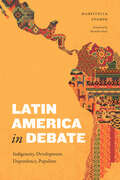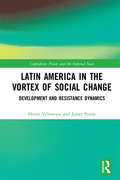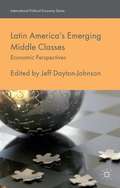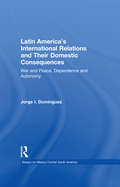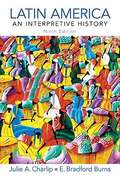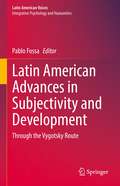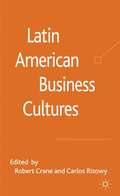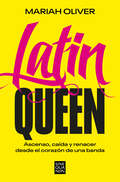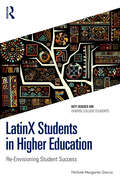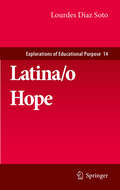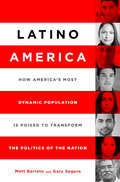- Table View
- List View
Latin America in Colonial Times
by Matthew Restall Kris LaneFew milestones in human history are as dramatic and momentous as the meeting of three great civilizations on American soil in the sixteenth century. Latin America in Colonial Times presents that story in an engaging but scholarly new package, revealing how a new civilization - Latin America - emerged from that encounter. The authors give equal attention to the Spanish and Portuguese conquerors and settlers, to the African slaves they brought across the Atlantic, and to the indigenous peoples whose lands were invaded. From the dawn of empires in the fifteenth century, through the conquest age of the sixteenth, to the end of empire in the nineteenth, Latin America in Colonial Times combines broad brush strokes with the anecdotal details that bring the era to life.
Latin America in Colonial Times
by Matthew Restall Kris LaneFew milestones in human history are as dramatic and momentous as the meeting of three great civilizations on American soil in the sixteenth century. Latin America in Colonial Times presents that story in an engaging but scholarly new package, revealing how a new civilization - Latin America - emerged from that encounter. The authors give equal attention to the Spanish and Portuguese conquerors and settlers, to the African slaves they brought across the Atlantic, and to the indigenous peoples whose lands were invaded. From the dawn of empires in the fifteenth century, through the conquest age of the sixteenth, to the end of empire in the nineteenth, Latin America in Colonial Times combines broad brush strokes with the anecdotal details that bring the era to life.
Latin America in Debate: Indigeneity, Development, Dependency, Populism (Latin America in Translation)
by Maristella SvampaIn Latin America in Debate, eminent Argentine social theorist, novelist, and activist Maristella Svampa provides a broad and accessible overview of the key political and intellectual debates in Latin America from the early twentieth century to the present. She examines four main topics: the place of indigenous peoples in postcolonial nation-states; the impact of development on the Latin American political imagination; the impact of being economically dependent within a global capitalist order; and the turn to populism as a particular political response to these various challenges. Svampa traces each debate’s genealogy, contextualizes them over the course of the twentieth century, and demonstrates how intellectual and sociological currents have redefined and reshaped them in the twenty-first. Svampa also maps the tensions in each and shows how they influence contemporary Latin American politics. By focusing on indigeneity, development, dependency, and populism, Svampa provides a clear entry point to understand the most pressing issues confronting Latin America while showcasing how the region’s intellectuals have been thinking about and debating these issues in ways that generate social theory with global implications.
Latin America in the Modern World
by Peter V. N. Henderson Bryan McCann Virginia GarrardLatin America in the Modern World is the first text to situate the history of Latin America within a wider global narrative. Written by leading scholars, the book focuses on five themes: state formation; the construction of national identity through popular culture and religion; economics and commodities; race, class, and gender; and the environment. Emphasizing the distinct experiences of each of the Latin American countries, the book provides students with an entry point into understanding this vital region. Instead of suggesting that all Latin American nations have an interchangeable heritage, the authors seek to clearly identify themes, topics, people, and intellectual currents that help to knit the history of modern Latin America into a coherent category of study. While providing in-depth coverage of the history of the three largest Latin American countries (Mexico, Brazil, and Argentina), Latin America in the Modern World also offers case studies from almost all of the countries, including Central American and Andean nations.
Latin America in the Vortex of Social Change: Development and Resistance Dynamics (Capitalism, Power and the Imperial State)
by Henry Veltmeyer James PetrasThis book explores the dynamics of the recent ‘progressive cycle’ in Latin American politics, associated with a red and pink tide of regime change. With this cycle of centre-left regimes oriented towards an alternative post-neoliberal form of development now coming to an end, coinciding with the end of a ‘primary commodities boom’ (the demand for natural resources exported in primary form on the world market), the authors seek to explore the dynamics of the transition from a progressive cycle of regimes oriented towards the search for a more inclusive form of development towards what appears to be another swing in the pendulum of electoral politics towards the far right and a return to neoliberal orthodoxy. Within the vortex of forces of change pushing towards both the Left and the Right, Latin America lies at the centre of ongoing heated theoretical and political debates as to how to bring about a more inclusive and sustainable form of post-neoliberal and post-capitalist development. Latin America in the Vortex of Social Change crucially aims to cut through these debates and explore the dynamics of the forces of change at work in the current conjuncture of capitalist development. With reference to a theoretical framework based on the interaction of three different forms of capitalism (capitalism as usual, extractive capitalism, narco-capitalism), the authors proceed to an analysis of the development and resistance dynamics of the development process that is unfolding on the Latin American political landscape. The book will appeal to scholars of political sociology and political theory with an interest in the political economy of development and Latin American affairs.
Latin America's Emerging Middle Classes
by Jeff Dayton-JohnsonWhat does it mean to be middle-class in Latin America? How is the middle class changing? What are the implications for economic development? Many look to the emergence of a middle class as a sign of Latin America's success in reducing poverty and inequality, a claim this book confirms. Political and business leaders hope that a booming middle class will drive economic growth and support progressive but not revolutionary political platforms, lending economic and democratic stability to countries long wracked by volatility. The contributors document the remarkable emergence of this middle group in Latin America (whose measurement turns out not to be an easy task). However, the authors consider it premature to declare middle-class Latin Americans ready to serve as a motor for economic growth or guarantors of democratic consolidation. Smart policies can nevertheless protect middle classes from poverty and allow them to fulfil the hopes invested in them.
Latin America's International Relations and Their Domestic Consequences: War and Peace, Dependence and Autonomy, (Essays on Mexico Central South America)
by Jorge I DominguezFirst Published in 1994. Volume 6 in the 7-volume series titled Essays on Mexico, Central and South America: Scholarly Debates from the 1950s to the 1990s. The central scholarly articles concern interstate peace along with a U.S. propensity to intervene, and international structural vulnerabilities and economic asymmetries along with the significance of elite skills and choices. This title recognises that scholars have paid more attention to international economics in Latin America and seeks to balance the range study.
Latin America: An Interpretive History (Ninth Edition)
by Julie A. Charlip E. Bradford BurnsFor courses in the History of Latin America and Modern Latin America. Organized thematically, this text offers a clear narrative that weaves the story of Latin America together with coverage of broader themes and regional differences. In addition to the great diversity within Latin America, there is also a common theme that encompasses the sweep of history in the region. The original author of the text, E. Bradford Burns, cast the problem as the paradox that poor people inhabit rich lands. The reason for this paradox is that a tiny group of elites confuses their nation's well-being with their own. When this text was first published in 1972, there were very few texts on Latin America, and the ones that existed largely read like catalogs of historical events. Although there are others now, this textbook is still a leader in the field because of its clear thematic organization and a central narrative that tells a cohesive story, albeit with many variations. Co-author Julie A. Charlip is committed to continuing the Burns legacy. Despite changes in research, interpretations, and theories, Burns's basic premise is still the most accurate and succinct, providing the best framework for approaching the region.
Latin American Advances in Subjectivity and Development: Through the Vygotsky Route (Latin American Voices)
by Pablo FossaThis is the first book in English to show how the work of Lev Vygotsky gave rise to a prolific and original school of cultural-historical psychology in Latin America. In recent decades, Latin American researchers have expanded Vygotskyan conceptualizations and applied practical theory to psychological and educational research and practice, but until now this production remained virtually unknown for English speaking audiences since it has been mainly published in Spanish and Portuguese. This timely volume contributes to change this situation by presenting a panoramic picture of the state of the art of cultural-historical psychology in Latin America. The book is divided in two parts. The first part shows how Latin American researchers used Vygotsky’s work to develop new theoretical elaborations and empirical advances to deal with different political, social and cultural problems in the region. The second part presents an overview of the current state of cultural-historical psychology in Latin America. Throughout its 15 chapters, the book shows how Latin American researchers contributed to the studies of different aspects of the cultural-historical theoretical conception of the development of higher psychological functions, such as concept formation, inner speech, zone of proximal development and imagination, and how these theoretical elaborations have been applied to research and practice in fields such as sociocultural psychology, developmental psychology, psychotherapy and education in Argentina, Brazil, Chile, Colombia, Cuba, Mexico, Peru and Puerto Rico.Latin American Advances in Subjectivity and Development - Through the Vygotsky Route will be an invaluable resource to researchers, students and practitioners in the fields of psychology, education and other social sciences interested in discovering or learning more about the original Latin American school of cultural-historical psychology.
Latin American Business Cultures
by Robert Crane Carlos RizowyHow often has an American or European businessman been astonished to have his Mexican or Brazilian counterpart break off discussions without explanation and refuse to return his calls? This book helps non-Latin American businessmen or MBA students address the region. If you want to study or work in Latin America this is a must read.
Latin American Perspectives on Science and Religion ("International Perspectives on Science, Culture and Society" #1)
by Ignacio SilvaLatin America plays an increasingly important role in the development of modern Christianity yet it has been underrepresented in current scholarship on religion and science. In this first book on the subject, contributors explore the different ways that religion and science relate to each other.
Latin American Religion in Motion
by Christian Smith Joshua ProkopyLatin America is undergoing a period of intense religious transformation and upheaval. This book analyzes some of the more important new discoveries about religious movements in the region. It examines important shifts such as the expansion and politicization of Protestantism, the ongoing transformation of the Catholic church, the growth of Afro-Brazilian religions, and the genuine pluralization of faith.
Latin American State Building in Comparative Perspective
by Marcus J. KurtzLatin American State Building in Comparative Perspective provides an account of long-run institutional development in Latin America that emphasizes the social and political foundations of state-building processes. The study argues that societal dynamics have path-dependent consequences at two critical points: the initial consolidation of national institutions in the wake of independence, and at the time when the "social question" of mass political incorporation forced its way into the national political agenda across the region during the Great Depression. Dynamics set into motion at these points in time have produced widely varying and stable distributions of state capacity in the region. Marcus J. Kurtz tests this argument using structured comparisons of the post-independence political development of Chile, Peru, Argentina, and Uruguay.
Latin American Transnational Children and Youth: Experiences of Nature and Place, Culture and Care Across the Americas (Routledge Spaces of Childhood and Youth Series)
by Victoria Derr Yolanda Corona-CaraveoLatin American Transnational Children and Youth focuses on understanding young people’s connection to nature and place within a transnational and Latin American context. It serves to diversify, elaborate, and sometimes challenge the assumptions made in researching people and place, and unearths the complexities of a world in which the identity of many is not shaped by a single place or culture, but instead by complex interactions among these. Spanning across ages and geographies, the book explores the central themes of sense of place, identity, and environmental action, with an emphasis on Latinx and Indigenous communities. This book balances theoretical questions with geographically contextual empirical research. Each section is situated in current interdisciplinary research and provides geographically specific examples of children and youth’s perspectives on place relations, migration, transnationalism, and an emerging demographic of environmentalists. Contributors from Latin America and the United States advance the fields of childhood and youth studies, environmental psychology, geography, sociology, planning, and education. This book looks across the Americas, to see how young people experience their worlds and constructively contribute to their places and environments.
Latin Queen: Ascenso, caída y renacer desde el corazón de una banda
by Mariah OliverRenacer es cambiar tu historia. De líder de una banda organizada a investigadora. Mariah Oliver, exmiembro y fundadora de la Nación Latin King y antigua Latin Queen, nos acerca a su historia personal, así como a la raíz del problema que lleva a miles de jóvenes, en todo el mundo, a buscar en las pandillas callejeras su lugar en el mundo. «Entrar en la cárcel es duro, obviamente, pero salir no es un camino de rosas. Mientras cualquiera puede ponerse en el lugar de quien entra en prisión y lo que eso supone, se nos hace más difícil, en general, entender qué puede haber de malo en ser libre de nuevo. Yo ni siquiera soy un buen ejemplo de esa situación, porque apenas pasé allí unos meses; sin embargo, incluso en ese corto periodo de tiempo, algo ha cambiado fuera, y todo te ha cambiado por dentro. Has sentido cosas que no habías sentido nunca y le has visto las costuras al sistema. No hay retorno a la vida de «antes de»».«El libro que el lector tiene en sus manos es mucho más que un testimonio autobiográfico de primer orden: también es la primera página de un tratado teórico sobre la situación de las mujeres en las bandas. Ojalá el testimonio de Maverick/María no caiga en saco roto y sirva como toque de alerta sobre las políticas que se están llevando a cabo. Aunque no sirva para eso, se trata de un testimonio literario de gran valor que, sin duda alguna, atrapará al lector».Carles Feixa, IP del proyecto TRANSGANG
LatinX Students in Higher Education: Re-Envisioning Student Success (Key Issues on Diverse College Students)
by Nichole Margarita GarciaThe most recent addition to the “Key Issues on Diverse College Students” series, this important volume bridges theory to practice in order to help higher education professionals support LatinX students in colleges and universities. LatinX Students in Higher Education challenges the traditional metrics of student success in higher education for LatinX students, offering a revised definition of student success to re-envision the skills and abilities that these students bring from their communities into institutions of higher education and community-based settings. Garcia’s powerful counter-story narratives shed light on the urgent need for systemic reform, and ultimately this book challenges institutions to adopt more inclusive and anti-racist practices that honor cultural identity, community, and resilience. This is a must-read for researchers, educators, student affairs professionals, students, and policymakers committed to creating an equitable higher education system and promoting the success of LatinX populations in higher education.
Latina Activists Across Borders: Women's Grassroots Organizing in Mexico and Texas
by Milagros PeñaOver the past twenty-five years, nongovernment organizations (NGOs) run by women and devoted to advancing women's well-being have proliferated in Mexico and along both sides of the U. S. -Mexico border. <P><P> In this sociological analysis of grassroots activism, Milagros Pea compares women's NGOs in two regions--the state of Michoacn in central Mexico and the border region encompassing El Paso, Texas, and Ciudad Jurez, Mexico. In both Michoacn and the border region, women have organized to confront a variety of concerns, including domestic violence, the growing number of single women who are heads of households, and exploitive labor conditions. By comparing women's activism in two distinct areas, Pea illuminates their different motivations, alliances, and organizational strategies in relation to local conditions and national and international activist networks. Drawing on interviews with the leaders of more than two dozen women's NGOs in Michoacn and El Paso/Ciudad Jurez, Pea examines the influence of the Roman Catholic Church and liberation theology on Latina activism, and she describes how activist affiliations increasingly cross ethnic, racial, and class lines. Women's NGOs in Michoacn put an enormous amount of energy into preparations for the 1995 United Nations-sponsored World Conference on Women in Beijing, and they developed extensive activist networks as a result. As Pea demonstrates, activists in El Paso/Ciudad Jurez were less interested in the Beijing conference; they were intensely focused on issues related to immigration and to the murders and disappearances of scores of women in Ciudad Jurez. Ultimately, Pea's study highlights the consciousness-raising work done by NGOs run by and for Mexican and Mexican American women: they encourage Latinas to connect their personal lives to the broader political, economic, social, and cultural issues affecting them.
Latina Bilingual Education Teachers: Examining Structural Racism in Schools (Routledge Research in Education #22)
by Yukari Takimoto AmosUsing critical race theory and whiteness studies as theoretical frameworks, this book traces two Latina bilingual education teachers in three different professional phases: as paraprofessionals, teacher candidates, and certified teachers. Grounded in a longitudinal case study, this book sheds light on the effects of institutional racism when Latina/o educational professionals attempt inclusion in white dominant organizations, such as schools. Revealing and analyzing the structural racism present in schools and the obstacles it creates for professionals of color, the author exposes the racist practices that are hidden from view and offer practical solutions to combat them.
Latina Girls: Voices of Adolescent Strength in the U.S.
by Jill Denner and Bianca L.GuzmánLatinas are now the largest minority group of girls in the country. Yet the research about this group is sparse, and there is a lack of information to guide studies, services or education for the rapidly growing Latino population across the U.S. The existing research has focused on stereotypical perceptions of Latinas as frequently dropping out of school, becoming teen mothers, or being involved with boyfriends in gangs.Latina Girls brings together cutting edge research that challenges these stereotypes. At the same time, the volume offers solid data and suggestions for practical intervention for those who study and work to support this population. It highlights the challenges these young women face, as well as the ways in which they successfully negotiate those challenges. The volume includes research on Latinas and their relationships with family, friends, and romantic partners; academics; career goals; identity; lifelong satisfaction; and the ways in which they navigate across cultures and gender roles.Latina Girls is the first book to pull together research on the overall strengths and strategies that characterize Latina adolescents' lives in the U.S. It will be of key interest and practical use to those who study and work with Latina youth.
Latina Issues (ella) (Herstory): Fragments of Historia(ella) (Herstory)
by Antoinette Sedillo LópezThis book attempts to make Latina history visible and Latina voices heard. It focuses solely on women – not to marginalize Latina stories but to showcase them, illustrating Latina perspectives on colonization, gender, race, and class.
Latina Lesbian Writers and Artists
by Maria Dolores CostaExplore a little-known side of the lesbian artistic world! With this book, you&’ll explore the work of the most significant contemporary Latina lesbian writers, artists, and performers in the United States, Latin America, and Spain. This book presents and analyzes literature, art, and poetry by women who, despite markedly different backgrounds and experiences, are all strongly influenced by the concept of lesbian identity. Latina Lesbian Writers and Artists begins with an essential A-to-Z overview of modern Latina lesbian authors and performers. From Cuban writer Magaly Alabau to literary critic Yvonne Yarbro-Bejarano, you&’ll learn who these women are, where they&’re from, and what they&’ve chosen as the focus of their work. The rest of the book is structured to give you a look at the work Latina lesbians in the United States and then moves geographically outward, first to Latin America, then to Spain. "Tortilleras on the Prairie: Latina Lesbians Writing the Midwest" provides a unique look at a much-neglected component of Latina lesbian writing-that of the Latinas living far from the East and West Coast hubs of both Latino and queer cultures, exploring Latina lesbian literary production in places like Kansas and Nebraska. "The Role of Carmelita Tropicana in the Performance Art of Alina Troyano," appraises the imaginative, hilarious, and insightful work of Cuban-American performance artist Alina Troyano (better known by her stage name, Carmelita Tropicana), examining the strategies she used (code switching, the breaking of heterosexist norms, the development of alter-egos, and more) to create a hybrid identity as an artist and performer. "Moving La Frontera Toward a Genuine Radical Democracy in Gloria Anzaldúa&’s Work" shows us how Anzaldúa&’s pivotal work Borderlands has revolutionized academic perceptions of the border and of identity in Latin American/U.S. Latino literature. You&’ll also find passionate poetry created by Latina lesbians. "Como Sabes, Depresión" is a fragment of a passionate bilingual poem written by an English-speaking poet enamored of the Spanish language, and "To Sor Juana" is a poem dedicated to the seventeenth century poet and nun who has become an icon among Latina lesbians. "Lesbianism and Caricature in Griselda Gambaro&’s Lo impenetrable" shows how lesbian characters and themes in the works of this Argentine novelist are used to satirize and undermine the perverse social values of patriarchal dictatorship. "The (In)visible Lesbian: The Contradictory Representations of Female Homoeroticism in Contemporary Spain" introduces us to some of Spain&’s lesbian authors and communicates the difficulties lesbian writers in that country and around the world have had in finding a receptive audience.
Latina Teachers: Creating Careers and Guarding Culture (Latina/o Sociology #3)
by Glenda M. FloresWinner, 2018 Outstanding Contribution to Scholarship Book Award presented by the American Sociological Association's Section on Race, Class, and GenderHonorable Mention, 2018 Distinguished Contribution to Research Book Award presented by the American Sociological Association's Latina/o Sociology SectionHow Latina teachers are making careers and helping students stay in touch with their roots.Latina women make up the fastest growing non-white group entering the teaching profession at a time when it is estimated that 20% of all students nationwide now identify as Latina/o. Through ethnographic and participant observation in two underperforming majority-minority schools in Los Angeles, as well as interviews with teachers, parents and staff, Latina Teachers examines the complexities stemming from a growing workforce of Latina teachers. The teachers profiled use Latino cultural resources and serve as agents of ethnic mobility. They actively teach their students how to navigate American race and class structures while retaining their cultural roots, necessary tactics in an American education system that has not fully caught up with the nation’s demographic changes. Flores also explores the challenges faced by Latina teachers, including language barriers and cultural acclimation, and professional inequalities that continue to affect women of color at work. An unprecedented look at an understudied population, Latina Teachers presents an important picture of the women who are increasingly shaping the way America’s children are educated.
Latina/o Hope
by Lourdes Diaz SotoThere are an estimated forty-eight million Latinas/os living in the United States, roughly sixteen percent of the population. Not only are they the largest minority group in the country but also the youngest: one out of five children is Latina/o. The rise in the Latina/o population has caused for panic in some areas of the country, resulting in hostile and sometimes violent racism and xenophobia, and yet, much of that hatred is fueled not on facts but rather on myths about immigration. To date, most studies on immigration have been data driven, focusing on migrating groups or policy analyses. Latina/o Hope is different. It incorporates salient theories on migration as it moves toward a new theorizing, one that views immigration from the immigrant's perspective. Thus, it integrates research into the depiction of various slices of immigrant experience--the young women disappearing in the city of Juarez, the various students at various stages of their educational journeys, the young children in need of ESL programs, the ethnically-mixed immigrants, the undocumented workers, and others. Latina/o Hope discusses the impact of neoliberal policies and global capitalization on the daily lives of Latina/o immigrants, serving as an inspiration for dialogue, praxis and imagination to love and serve one another.
Latine Psychology Beyond Colonialism (International and Cultural Psychology)
by Edil Torres RiveraThis book examines the colonial structure as it applies to Latine populations and demonstrates how the remnants of that structure continue to affect this ethnic group. It will show that the colonial perspective is aligned with a racist viewpoint and the many ways in which this undermines psychological stability. Currently, many psychologists dealing with this population focus on individual deficits or disorders without the clarifying lens of social justice. In this way, the book will unravel the various strands of socio-political stressors and the disabling effects of lingering oppression. It will serve to bring new insights to those studying this group, as well as the many mental health workers that provide services. The result is an identification of a native psychology that is uniquely tailored to these particular individuals.
Latino America: How America's Most Dynamic Population is Poised to Transform the Politics of the Nation
by Gary M. Segura Matt BarretoSometime in April 2014, somewhere in a hospital in California, a Latino child tipped the demographic scales as Latinos displaced non-Hispanic whites as the largest racial/ethnic group in the state. So, one-hundred-sixty-six years after the Treaty of Guadalupe Hidalgo brought the Mexican province of Alta California into the United States, Latinos once again became the largest population in the state. Surprised? Texas will make the same transition sometime before 2020. When that happens, America’s two most populous states, carrying the largest number of Electoral College votes, will be Latino. New Mexico is already there. New York, Florida, Arizona, and Nevada are shifting rapidly. Latino populations since 2000 have doubled in Alabama, Arkansas, Georgia, and South Dakota. The US is undergoing a substantial and irreversible shift in its identity. So, too, are the Latinos who make up these populations. Matt Barreto and Gary M. Segura are the country’s preeminent experts in the shape, disposition, and mood of Latino America. They show the extent to which Latinos have already transformed the US politically and socially, and how Latino Americans are the most buoyant and dynamic ethnic and racial group, often in quite counterintuitive ways. Latinos’ optimism, strength of family, belief in the constructive role of government, and resilience have the imminent potential to reshape the political and partisan landscape for a generation and drive the outcome of elections as soon as 2016.


